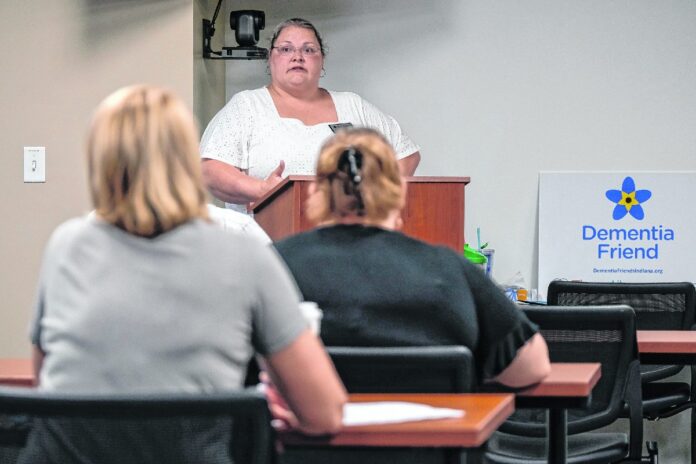
With a growing number of Baby Boomers now in retirement, the number of Hoosiers affected by dementia is likely to grow rapidly.
While 1 in 9 who are over 65 suffer from some form of dementia, that figure rises to one-half of all people 85 and over, according to the Alzheimer’s Association.
Although that statistic might make some uncomfortable, others say it illustrates a need for the Columbus area to be more dementia friendly — for residents to better understand dementia — and to work to accommodate current and future challenges.
A recent effort now underway in Bartholomew County is an expansion of the Dementia Friends Indiana organization.
[sc:text-divider text-divider-title=”Story continues below gallery” ]Click here to purchase photos from this gallery
The program’s goal is to help local residents understand that people with dementia not only require an occasional helping hand, but also need to feel included in their community, according to Kimberly Self, program director for the Aging and Disabled Resource Center.
Several concepts and values advocated by Dementia Friends Indiana were outlined by Self during workshops attended by about 16 people at the Thrive Alliance offices on June 21.
Dementia is an overall term that describes a wide range of symptoms associated with a decline in memory or other thinking skills severe enough to reduce a person’s ability to perform everyday activities, Self said.
From helping someone find the right bus to educating others about dementia on social media, there are a number of things that one person can do to help those suffering from dementia, Self said.
Christy Henderson, a referral specialist with Our Hospice of South Central Indiana, agrees. She said one of the best lessons she took away from attending the workshop was the understanding that if you see someone who seems lost or confused, don’t be afraid to ask them if you can help.
“It’s best to be patient and supportive than to be critical of someone we perceive as different,” Henderson said.
In addition, the conversation tips for talking with dementia patients from Dementia Friends Indiana will become a valuable resource that can be distributed to family and friends of dementia patients, Henderson said.
Another tip that Henderson found valuable was that if a patient stares off during a conversation, the long pause is likely because it takes them about 20 seconds to process information.
Suzy Singer, another workshop participant and an administrator with Our Hospice of South Central Indiana, said she usually sees Alzheimer’s patients when they are in the late stage of dementia. But the presentation taught her the importance of establishing a line of communication with those in the early stages of dementia.
“If these patients can work with someone with a different mind, it sharpens their social interaction skills and makes them feel more valued, which contributes to good mental health,” Singer said.
Local residents are being encouraged to develop their own ways of assisting those with dementia, said Sue Lamborn, the outreach and community relations manager for Thrive Alliance.
“We’re asking you to take this initiative, and do some things with it in terms of the neighborhoods you live in, the people you go to church with and the people you work with,” Lamborn told those who attended one of the workshops.
For example, Lamborn suggested that a small restaurant in Columbus could establish some dementia-friendly dining hours “where you have eight things on the menu, instead of 80.”
But ideally, each sector of a dementia-friendly city has a unique role to play, whether it is a hospital or health care settings, a business or retail locations, community-based services, faith communities, local government or residential care, according to the Dementia Friends Indiana website.
In essence, Dementia Friends attempts to break down the stigmas about dementia, and implement practical changes to make life easier for those with these types of cognitive problems, Lamborn said.
In her presentation, Self provided five key messages that she says everyone should know about dementia:
It is not a normal part of aging. Not everyone who grows old will develop dementia.
Dementia is caused by diseases of the brain. While the most common is Alzheimer’s, there are other causes.
This condition is not just about having memory problems. Dementia can also affect thinking, communication and doing everyday tasks.
It is possible to have a good quality of life with dementia.
There’s more to the person than the dementia. People with this infliction are a valuable part of the community.
Dementia Friends also is concerned about looking out for the welfare of the caregivers who look after those with dementia, Self said. Caregivers have an increased risk for anxiety, depression and poor quality of life than caregivers of other conditions, according to the National Center on Care Giving.
Originally launched by the Alzheimer’s Society in the United Kingdom in 2013, Dementia Friends was established in the United States for the first time at multiple locations in Minnesota. By 2015, the program expanded to 16 states, and either now operates or is launching in 36 states.
Dementia Friends Indiana is administered by the Indianapolis-based CICOA Aging & In-Home Solutions, the state’s largest area agency on aging that serves eight counties including Marion, Johnson and Shelby counties.
[sc:pullout-title pullout-title=”What is a dementia-friendly community?” ][sc:pullout-text-begin]
Dementia-friendly communities are villages, towns and cities where more people understand dementia, there is less fear and avoidance, and people living with dementia are included and supported to live independently for longer periods of time.
Some example of being a dementia-friendly community are:
- Establishing businesses with dementia-informed services and environments for customers and employee caregivers
- Health care that promotes early diagnosis and uses dementia care best practices along the care continuum
- Residential settings that offer memory loss services and support
- Dementia-aware and responsive legal and financial planning
- Welcoming and supportive faith communities
Source: Dementia Friends USA website.
[sc:pullout-text-end][sc:pullout-title pullout-title=”Conversation tips ” ][sc:pullout-text-begin]
When approaching a person with dementia to start a conversation:
- Come from the front, identify yourself and keep good eye contact. If the person is seated or reclined, go down to that level.
- Call the person by their preferred name to get his or her attention.
- Use short, simple phrases and repeat information as need. Ask one question at a time.
- Speak slowly and clearly. Use a gentle and relaxed tone.
- Patiently wait for a response while the person takes time to process what you said.
During the conversation:
- Provide a statement rather than ask a question. For example, say, "The bathroom is right here" instead of asking, "Do you need to use the bathroom?"
- Avoid confusing and vague statements about something you want the person to do. Instead, speak directly: "Please come here. Your shower is ready." Name an object or place. For example, rather than "Here it is," say, "Here is your hat."
- Turn negatives into positives. Instead of saying, "Don’t go there," say, "Let’s go here."
- Give visual cues. Point or touch the item you want the person to use or begin the task for him or her.
- Avoid quizzing. Reminiscing may be healthy, but avoid asking, "Do you remember when …?"
- Try using written notes or pictures as reminders if the person is able to understand them.
[sc:pullout-text-end]




